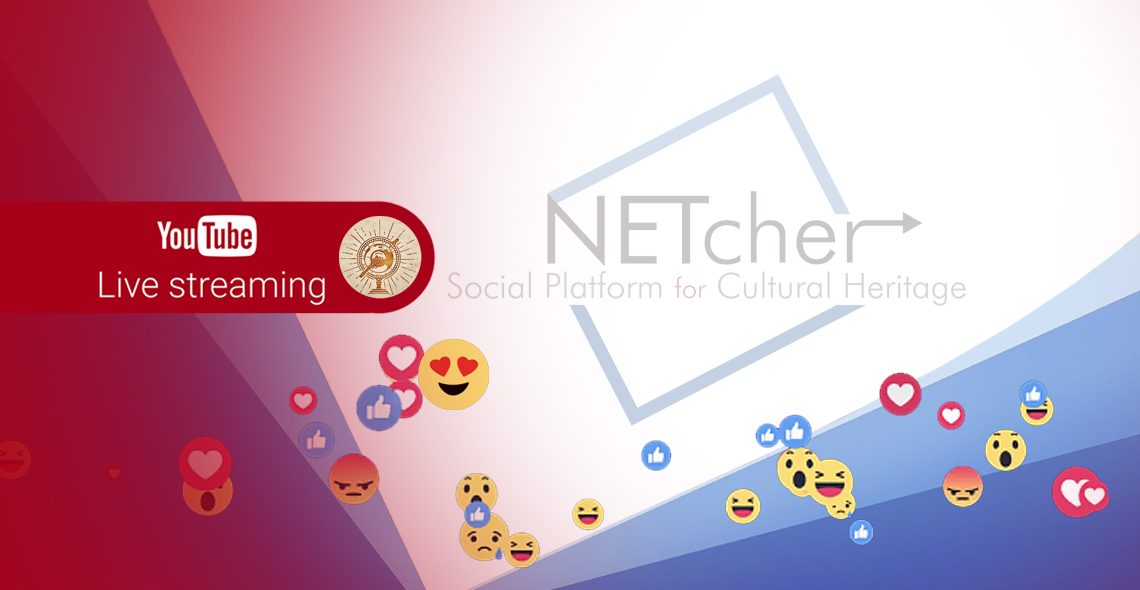Via the Charlie Danger YouTube Channel
NETCHER live (via Charlie Danger’s Live You Tube) featured a discussion between various experts on the trafficking of artefacts. It was streamed on 21st September 2020.
The live session attracted a considerable amount of engagement with 1000 viewers and a constant flow of comments being posted on the live chat throughout.
There was a diverse audience from across Europe and beyond, including students, people working in archaeology and museums, those looking to work in archaeology and people who had found artefacts.
Comments from the audience mostly included questions and remarks on the topics being discussed. Unexpectedly, there were also donations of money to the page from certain viewers, implying a keen interest in helping the experts find ways of combatting artefact trafficking.
The live video was centred around a game Charlie Danger played with viewers and experts. This game involved recounting an anecdote to the audience on the subject of the looting and trafficking of artefacts, which viewers would decide was true or false. The game proved a good way to engage the audience. There were many “true” and “false” responses stemming from the questions, demonstrating a high level of viewer interest and participation.
Other comments from the audience expressed a lack of awareness of the Netcher project and the problems of the looting and trafficking of artefacts in general.
For example, Gaël G commented: ‘Je suis dans le domaine de l’archéologie et je n’avais jamais entendu parler du projet Netcher, c’est vraiment intéressant et je suis bien content qu’un tel projet existe!’ [I am in the field of archaeology and I had never heard of the Netcher project, it’s really interesting and I’m very happy that a project like this exists!]
Various questions were also raised throughout the live video. A popular question among viewers asked what to do if they found an object at random or without meaning to, and who to contact. These ranged from general inquiries to more specific queries that talk about certain objects people have found. A viewer with the username 12 ème commented: ‘J’ai une question, j’ai un ossement possiblement humain venant d’un site archéologique, que puis-je faire? dois-je le garder?’ [I have a question, I have in my possession a human bone from perhaps an archaeological site, what should I do, can I keep it]
This demonstrates how Charlie Danger’s live video provided a sense of a good link with experts who can clearly communicate what to do in more specific situations. It also perhaps indicates a lack of availability of information about how to act after discovering an artefact, or at least a lack of awareness of the steps to take.
In fact, a question asked by several users concerned what counts as an artefact, and how to know when an object becomes an artefact.
Kolimar Velcor asked: ‘Comment détermine-t-on qu’un objet est une antiquité? Y a-t-il une définition internationale?’ [How do we determine whether an object is an antique? Is there an international definition?]
Other users asked how long it takes for an object to be considered as an artefact, and how to know if it is legal or illegal to be in possession of an object. This suggests a need for clarity surrounding what counts as an artefact, and if this definition is universal or varies from country to country.
The audience was also interested in whether the person who handed in the object would get the blame and be punished. On the other hand, some viewers asked whether people who found and handed in potential artefacts would be rewarded. For instance, YouTube user Anthony Bourasseau asked: ‘Il y a une récompense financière?’ [Is there a financial reward?]
These questions suggest that people in the audience were not always aware of how handing in objects to the relevant authorities is perceived by such authorities.
The audience also asked how to combat the trafficking and looting of artefacts, and the loss of antique objects. They were interested in whether there were already solutions and proposed some of their own.
YouTube users such as Guigui Barrow asked: ‘What actions can we put in place to contribute against this traffic?’, and some users proposed the internet as something which could perhaps facilitate the search for lost and stolen objects in modern society.
Various viewers enquired as to whether there was already a list, database or book detailing stolen objects. For instance, Apophisie asked: ‘Est-ce qu’il existe un livre regroupant les objets qui ont été volés et qui n’ont pas été retrouvés?’ [Is there a catalogue of stolen objects, that have yet to be recovered]
This was put forward as a possible solution by some viewers.
In fact, some audience members seemed inspired by the prospect of finding solutions to the issue of artefact trafficking to the point of asking about possible careers in this field. There were several questions like the following, posted by Emma W:
‘Quels sont les parcours d’étude pour devenir spécialiste dans le traffic d’antiquités…? y a-t-il une formation particuliere?’
[What are the study routes you can take to become a specialist in artefact trafficking? Is there any particular training?]
Overall, the topics covered in the live video have clearly caught the attention of some members of the audience. There were various comments noting that it is sad that people are looting historical artefacts, showing an emotive response.
Many commented thanking Charlie and the experts for the live video, and there was a generally positive reaction to the fact that the video was conducted bilingually.
There were also several requests for the video to be available after the live stream ended, reflecting genuine audience interest in the subject.

